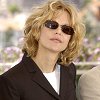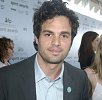 When they walk into the room you're not sure what your reaction should be. Here's Meg Ryan, America's Sweetheart, queen of the romantic comedy who's just starred in the deeply disturbing erotic thriller in which she's naked both physically and figuratively like you've never seen her before. Then there's Jane Campion, one of the most gifted and artful directors on earth, who makes difficult, confrontational movies like The Piano and Holy Smoke. And finally there's indie darling Mark Ruffalo, who plays low-key shadiness better than anyone--the slightly naughty guy we can't help but like. This incongruous trio settles in for a conversation about In the Cut, their new film, which still resonates a week or so after you've seen it.
When they walk into the room you're not sure what your reaction should be. Here's Meg Ryan, America's Sweetheart, queen of the romantic comedy who's just starred in the deeply disturbing erotic thriller in which she's naked both physically and figuratively like you've never seen her before. Then there's Jane Campion, one of the most gifted and artful directors on earth, who makes difficult, confrontational movies like The Piano and Holy Smoke. And finally there's indie darling Mark Ruffalo, who plays low-key shadiness better than anyone--the slightly naughty guy we can't help but like. This incongruous trio settles in for a conversation about In the Cut, their new film, which still resonates a week or so after you've seen it.So why this story? Why would Campion decide to make a thriller after all these agonizing dramas? "I read the novel in 1996 -- a friend recommended this amazing book to me -- and this woman felt like someone I knew," she says. "That the writer should come up with this world and these people who are so crude and brutally honest. The structure and machinations were really good."
But the road to the screen was a rough one. "I did make a mistake at the beginning," she admits, "saying to my backers that it would be like Seven. So the backers were set on something different from what we were moving towards." Campion laughs heartily and says that she let the money go because she didn't want to force the film into a genre. But the lower budget actually helped the film. "It's more streety, gritty, and there was less stress and responsibility and fewer expectations of a Hollywood movie," she says almost wistfully. "But you have to go with your own feelings. I do honour everyone's response. While the surface of the film is cold, everyone's looking to satisfy their heart's desire. It's a film with grief around it -- people with hearts who aren't satisfied, but they're searching. And that's the way we filmed it, with tenderness."
The film is fairly bold, even for Campion, but with a different star it probably wouldn't cause such ripples in the press. Ryan has made serious films (Proof of Life, Courage Under Fire, When a Man Loves a Woman -- to name three), but is more known for romantic sparring with Tom Hanks and faking orgasms opposite Billy Crystal in New York delis. "I had never read anything like this," she says of In the Cut. "I'd never done a thriller and I know Jane is so visual and internal. I always loved films fro the 1970s with antiheroes."
"Like Jane Fonda in Klute," Campion interjects, something she does often. And Ryan clearly doesn't mind. "I also looked at Taxi Driver, and the thing you remember about it is the poetic ways it's filmed -- honestly, observation. You look to these filmmakers in the 1970s--observation, purity. That was an inspiration."
Ryan bounces back: "I didn't feel like I went 'to the edge' this role. I was in sure hands with Jane and it didn't require too much bravery. She, the character, is brave to risk her heart for a guy. She's so broken and unlikely to connect with anyone like she does."
At which point Ruffalo seems to wake from his dreaminess. "The idea of playing this character did scare the hell out of me!" he jokes, then turns more thoughtful, "I had no common ground with him, so how would I access that character? It was really daunting. The most interesting thing was that on the outside, to survive, he has to maintain this armour, but inside is another person with longings outside his class. I asked Jane why she cast me and she said, 'I'm interested in your interior work and what you'll bring counter to what's on the page.'"
Campion explains this: "One of the limits we put on ourselves was no indicating what's inside. The cinematographer, editor and I told the cast that we would do that -- we're the filmmakers, we'll show that. I wanted them to be more like we are in life."




Campion, Ryan and Ruffalo

